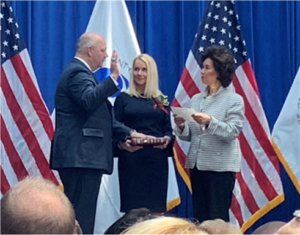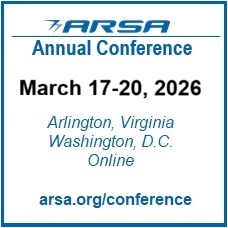Administrator Nears 90-Day Mark
Approaching the end of his third month on the job, FAA Administrator Stephen Dickson spoke to the aviation community on Nov. 12 at the Aero Club of Washington’s monthly luncheon. Being Dickson’s first time at the Aero Club; he joked, “somebody told me you have to give up your ‘outside the Beltway’ membership card if you come to one of these, so that’s why I stayed away.”
The administrator proved adept at making prepared remarks sound fresh without straying off-script, no small gift in Washington. Although there was little new in his statement, a few things may be of interest to aviation maintenance professionals:
On Boeing’s 737 MAX: Dickson repeated his previous public statement that “I am not going to sign off on this aircraft until I fly it myself and am satisfied that I would put my own family on it without a second thought.” (Dickson, a former airline captain, is rated on Boeing 727, 737, 757, 767 and Airbus A320 series aircraft.)
On MAX investigation fallout: “Some key themes are emerging regarding aircraft certification processes not only in the [United States], but around the world,” Dickson said. “I am committed to addressing each of these issues. They include: Moving toward a more holistic versus transactional, item-by-item approach to aircraft certification; Integrating human factors considerations more effectively throughout the design process, as aircraft become more automated and systems more complex; and Ensuring coordinated and flexible information flow during the oversight process.”
On the composition of the future fleet: The administrator noted the FAA has “registered about 1.5 million small drones, about 400,000 of which are for commercial purposes, and we’ve approved two Part 135 drone operators…[T]he FAA and its predecessors have been registering manned aircraft for 92 years, and after only four years…we’ve got four times as many on the books.” In addition to the expansion of registered UAS, Dickson noted the agency is currently engaged with the manufacturers of more than 15 electric vertical takeoff and landing aircraft.
In facing its challenges, Dickson believes the FAA “must continue leaning into our role as a data-driven, risk-based decision-making oversight organization that prioritizes safety above all else.”
For its part, the association has urged the administrator to focus in several key areas (see full story below):
(1) Support and enhance efforts to grow the aviation workforce, stand up the grant program established by the 2018 FAA reauthorization law, support industry efforts to reconsider every “pathway” through which maintenance professionals progress and modernizing the requirements for overseeing maintenance training and measuring competency.
(2) Maintain the collaboration among and between regulators and the regulated community to identify, assess, and mitigate risk.
(3) Commit to regulatory consistency.
(4) Stand up to political and media pressure and focus on initiatives that achieve the highest possible level of safety, based on risk, while minimizing additional burdens on industry.
ARSA’s engagement with the Administrator and FAA continues with these goals in focus.
Previous updates on Administrator Dickson...
8/13/19 - Dickson Sworn in as New FAA Administrator
August 13, 2019

Former Delta Senior Vice President of Flight Operations Stephen Dickson was sworn in as administrator of the FAA by U.S. Transportation Secretary Elaine Chao on Aug. 12.
Steve Dickson, former senior vice president of flight operations for Delta Air Lines, was sworn in as the FAA administrator by Transportation Secretary Elaine L. Chao on Aug. 12.
Dickson is a former U.S. Air Force officer and F-15 fighter pilot, a 1979 Airforce Academy Graduate and a graduate of the Georgia State University College of Law.
In his role at Delta, Dickson was responsible for the safety and operational performance of Delta’s global flight operations, as well as pilot training, crew resources, crew scheduling and regulatory compliance. He also flew in line operations as an A320 captain and previously flew the Boeing 727, 737, 757 and 767 during his career.
In his remarks at the swearing in ceremony at DOT headquarters, Dickson thanked President Trump for the nomination, Secretary Chao for her support during the nomination process and Dan Elwell (who was briefly a classmate of Dickson’s at the Air Force Academy and has served as acting administrator since last January; he will continue to serve as deputy administrator) for his “strong, principled leadership during a very challenging time in the agency’s history.”
“The U.S. aviation system is the safest, most dynamic and innovative in the world, largely due to the collaborative approach to safety championed by the FAA and shared by various segments of the industry,” Dickson said during ceremony. “While we have earned [the public’s] trust through our robust approach to safety, the job is not done. In fact, it is never done. We all have to work together to retain – and in places, restore – that trust.”
“The public, and all those who work in American aviation, should know that FAA will continue to lead as a values-driven organization,” Dickson said. “Our highest and most important value is safety – this cannot be compromised. A lesson I learned in my service to our country in the Air Force, and will bring to my leadership of the FAA, is that safety is a journey and not a destination. It’s a journey that we must embark upon with renewed vigor each and every day.”
In reference to the biggest issue on Dickson’s plate as he assumes the reins at FAA – the grounding of the Boeing MAX aircraft – he said that, “this plane will not fly in commercial service until I am completely assured that it is safe to do so. FAA is following no timeline in returning the aircraft to service. Rather, we are going where the facts lead us and diligently ensuring that all technology and training is present and correct before the plane returns to passenger service.”
Dickson said that the foundation of any safety program is a just culture that “places an extremely high value on front-line employee reporting.” With that in mind, he stated his commitment to collaboration between operators, regulators and labor and said he would do everything is his power to “walk the walk” on employee safety reporting programs and “ensure this same philosophy permeates all sectors of the aviation system.”
He also committed the agency to “continuous improvement” and maintaining the highest levels of safety while adapting to technological advancements will be a key part of the FAA’s success. “What we did yesterday will simply not be good enough tomorrow,” Dickson said.
For its part, ARSA is urging the new administrator to focus in several key areas:
(1) Support and enhance efforts to grow the aviation workforce, stand up the grant program established by the 2018 FAA reauthorization law, support industry efforts to reconsider every “pathway” through which maintenance professionals progress and modernize the standards by which the agency oversees maintenance training and measures competency.
(2) Maintain the collaboration among between regulators and the regulated community to identify, assess and mitigate risk.
(3) Commit to regulatory consistency.
(4) Stand up to political and media pressure and focus on initiatives that achieve the highest possible level of safety, based on risk, while minimizing additional burdens on industry.
ARSA looks forward to working with Administrator Dickson in the weeks and months ahead to move the maintenance industry’s agenda forward.








